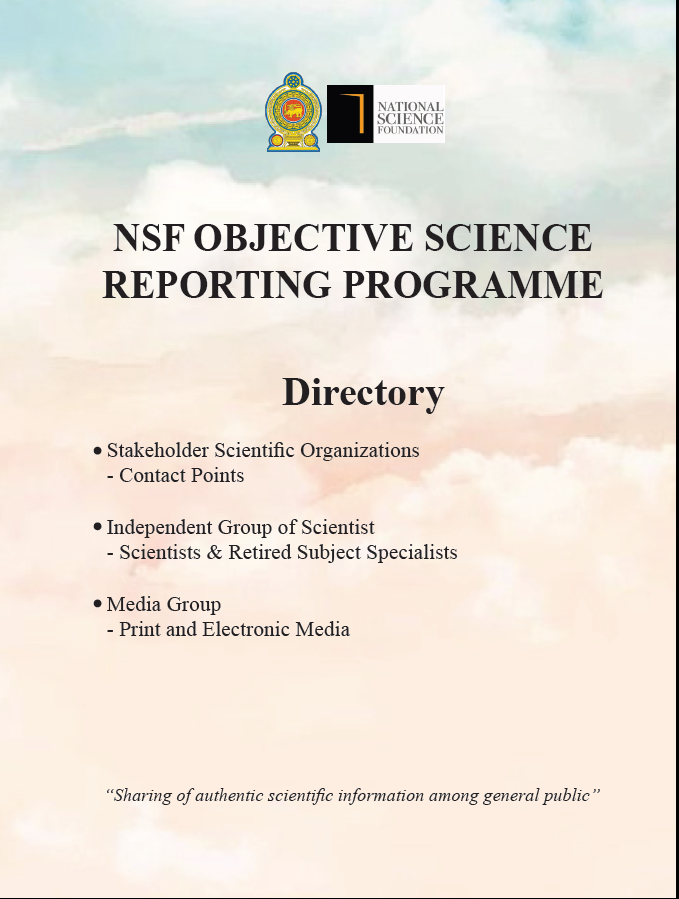
© National Science Foundation of Sri Lanka
First Edition : 2025
Compiled by : Media & Event Management Division
Graphics & Typesetting : Avinash Jayasinghe
Publisher : National Science Foundation
Disclaimer
The National Science Foundation (NSF) is not responsible for the information provided by the “Contact Points” from stakeholder scientific organizations or the “Independent Group of Scientists” (including university scientists and retired subject specialists from stakeholder scientific organizations) whose contact details are included in this Directory. Statements made by these individuals to the media are their own and do not reflect the views of the NSF.
Key Points
- Role of the NSF
As a part of the Objective Science Reporting Programme, the NSF facilitates media personnel in accessing reliable scientific information.
This is done through:
- “Contact Points” - representatives from stakeholder scientific organizations who provide primary scientific information.
- “Independent Group of Scientists” - university scientists and retired subject specialists who offer further clarification on complex or disputed scientific matters.
- Focus on Scientific Matters
When speaking to the media under the Objective Science Reporting Programme, individuals should strictly limit their explanations to the scientific aspects of the issue.
Criteria for “Contact Points”:
- Must have expertise in their scientific discipline and strong communication skills, enabling them to explain scientific concepts in simple local language.
- Must always be available for media inquiries and responsive to feedback.
- Must not be affiliated with any trade union.
- Must have official authorization from their relevant institutions to engage with the media on scientific matters.
- Consent of Listed Members
All individuals listed under “Contact Points,” “Independent Group of Scientists,” and the “Media Group” have given their consent for the NSF to publish their contact details in this Directory.
Brief Note on the Objective Science Reporting Programme
Objective science reporting in journalism means presenting scientific findings and information in a factual, unbiased, and transparent manner, prioritizing evidence and avoiding personal opinions or interpretations.
Accordingly, the “Objective Science Reporting Programme” is designed to facilitate media personnel to interact with a group of scientists to ensure taking authentic scientific information and facts excluding personal opinions of the media personnel through media channels (print & electronic and social media) to general public with the aim of improving science literacy of the people and thereby enabling taking informed decisions in day to day lives.
The existing science reporting system in Sri Lanka is required to be strengthen. Therefore, under this programme it is expected to strengthen skills and attitudes of media personnel of media organizations on objective science reporting as well as building capacity of on science communication to general public, policy makers, and other government officials.
Under this programme, a “Science Base” consisting of “Contact Points/ Contact Persons” identified from stakeholder scientific organizations, and “Independent Group of Scientists” (scientists currently serving in the universities and subject specialists retired recently - within 03-04 years from the above stakeholder scientific organizations) are introduced to the “Media Group”. The members of the “Science Base” have been categorized into 14 disciplines as follows, and media personnel can contact them based on the area they require to obtain authentic scientific information and facts
|
|
This Directory includes the contact information of members, which is subjected to annual updates. After the official launch of the OSR Programme, it is expected to organize a series of scientific forums, and to provide “training on science communication to public” for both scientists and media personnel with the aim of inculcating an efficient science reporting culture in the country.
- Media and Event Management Division
National Science Foundation
Table of Contents
Objective science reporting in journalism means presenting scientific findings and information in a factual, unbiased, and transparent manner, prioritizing evidence and avoiding personal opinions or interpretations.
Accordingly, the “Objective Science Reporting Programme” is designed to facilitate media personnel to interact with a group of scientists to ensure taking authentic scientific information and facts excluding personal opinions of the media personnel through media channels (print & electronic and social media) to general public with the aim of improving science literacy of the people and thereby enabling taking informed decisions in day to day lives.
The existing science reporting system in Sri Lanka is required to be strengthen. Therefore, under this programme it is expected to strengthen skills and attitudes of media personnel of media organizations on objective science reporting as well as building capacity of on science communication to general public, policy makers, and other government officials.
Under this programme, a “Science Base” consisting of “Contact Points / Contact Persons” identified from stakeholder scientific organizations, and “Independent Group of Scientists” (scientists currently serving in the universities and subject specialists retired recently - within 03-04 years from the above stakeholder scientific organizations) are introduced to the “Media Group”. The members of the “Science Base” have been categorized into 14 disciplines as follows, and media personnel can contact them based on the area they require to obtain authentic scientific information and facts.
| 01. Food & Nutrition | 08. Industries |
| 02. Agriculture & Veterinary | 09. Basic Sciences and R&D |
| 03. Power and Energy | 10. Archaeology |
| 04. Health | 11. Statistics |
| 05. Indigenous Medicine | 12. Social Security |
| 06. Environment | 13. Defence |
| 07. Disaster Management | 14. Information Technology |
This Directory includes the contact information of members, which is subjected to annual updates.
After the official launch of the OSR Programme, it is expected to organize a series of scientific forums, and to provide “training on science communication to public” for both scientists and media personnel with the aim of inculcating an efficient science reporting culture in the country.
- Media and Event Management Division
National Science Foundation.

